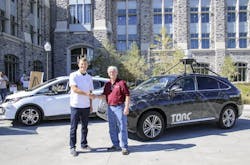Torc showcases self-driving car at Virginia Tech demo
As part of its ongoing support for Virginia Tech’s AutoDrive Challenge team, Torc Robotics showcased its self-driving Lexus RX car Friday at the university’s autonomous vehicle exhibit.
Virginia Tech is one of eight universities invited to compete in the AutoDrive Challenge, a three-year autonomous vehicle competition sponsored by the Society of Automotive Engineering (SAE) and General Motors. The competition’s goal is to navigate an urban driving course in a Level 4 autonomous mode by the year 2020.
Torc is providing knowledge and mentorship for the team of student engineers as it retrofits a 2017 Chevrolet Bolt electric vehicle, making it a fully autonomous car.
“Supporting the AutoDrive team is an opportunity for us to give back to Virginia Tech and foster the next generation of engineers,” said Torc CEO Michael Fleming. “These student-mentor relationships help us continue to hire top talent and work toward our mission of making self-driving technology commonplace in society.”
Torc and Virginia Tech have a longstanding relationship. In addition to graduating many of its employees, including Fleming, the university has partnered with Torc in several autonomous vehicle challenges.
In 2007, they entered the DARPA Urban Challenge as team Victor Tango. After completing a 60-mile race in four hours and 36 minutes, the team finished third and Torc emerged as a serious autonomous vehicle player.
They made history again in 2011 after enabling a blind person to independently drive the Daytona International Speedway. The team integrated Torc’s ByWire XGV technology into a modified 2010 Ford Hypbrid Escape as part of the National Federation of the Blind’s (NFB) Blind Driver Challenge.
The AutoDrive Challenge team is led by Al Wicks, associate professor of mechanical engineering at Virginia Tech. Wicks also worked with Torc in 2007 as an advisor to team Victor Tango.
"Working with Torc continues to help me as an educator,” he said. “Technology continues to change and Torc brings valuable knowledge of new developments in the field that I can then pass on to my students."
The first AutoDrive Challenge competition will take place in April at the GM proving grounds in Yuma, Arizona. As a tribute to the 10-year anniversary of the DARPA Urban Challenge, Virginia Tech’s AutoDrive team will compete again under the name Victor Tango.
For more information, click here

